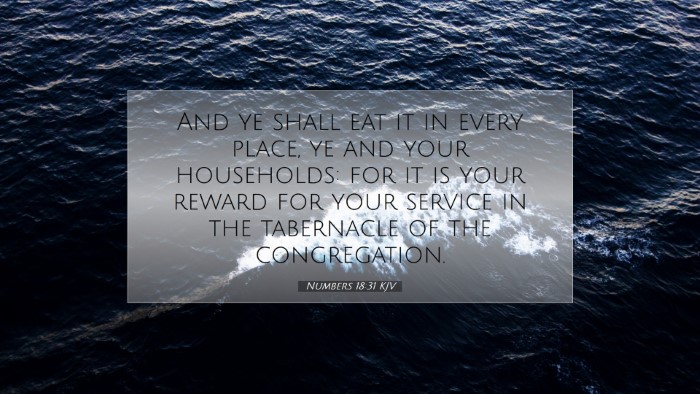Commentary on Numbers 18:31
Verse: "And ye shall eat it in every place, ye and your households: for it is your reward for your service in the tabernacle of the congregation." (Numbers 18:31 KJV)
Overall Context
This verse is situated within the broader context of the Levitical laws given to the Israelites, particularly relating to the roles and responsibilities of the Levites and priests. Numbers 18 outlines the provisions God made for the Levites, who were set apart for service in the tabernacle, emphasizing their unique role within the community of Israel.
Commentary Insights
Matthew Henry's Commentary
Matthew Henry emphasizes the significance of God's provision for the Levites, underscoring that their sustenance was a divine reward for their service. He points out that this allowance for the Levites reflects God’s justice in providing for those who dedicated their lives to His service. The emphasis on "in every place" suggests the freedom and the privilege of consuming their reward wherever they might be, indicating a special blessing and a sense of belonging to God’s work.
Albert Barnes' Notes
Albert Barnes notes that this provision also serves as a reminder of the sacred nature of the Levites' responsibilities. The directive to eat their reward in every place indicates inclusivity, ensuring the Levites’ families participate in the blessings of their labor. Furthermore, Barnes stresses that the term "service" highlights the active role the Levites played in their spiritual duties, validating their position and the necessity of their work within the community.
Adam Clarke's Commentary
Adam Clarke provides further insights by elaborating on the cultural implications of this provision. He points out that sharing their food with their households reinforces the community aspect of ministry. Clarke suggests that this reward system honors the Levites and reflects the idea of communal sustenance in biblical society. The notion of reward ties back to the broader understanding of divine benefits as a result of obedience and dedication in serving God and His people.
Theological Implications
This verse encapsulates key theological themes surrounding God's provision for His servants. It speaks to the divine responsibility to care for those who are set apart for ministry. The acknowledgment of the Levites’ labor signifies the cooperative relationship between God and His people, where service to God brings both spiritual and physical sustenance. Furthermore, the idea of eating the reward in every place can be universally applied to all who serve faithfully in varied capacities, suggesting that their work is always recognized and rewarded by God, emphasizing continual engagement with Him.
Application for Pastors and Theologians
For pastors and theologians, this verse serves as a reminder of the vital role of clergy within the church. It encourages them to reflect on their service's impact and the assurance of God’s provision. As they minister and serve their congregations, they are encouraged to find sustenance both spiritually and physically. Moreover, this verse can inspire discussions on how the church today supports its leaders, fostering environments where ministry personnel are nourished in all aspects of life.
Conclusion
Numbers 18:31, while directed towards the Levites, carries timeless principles applicable to various contexts of ministry today. It affirms the covenantal faithfulness of God, ensuring that those who are dedicated to His service are adequately cared for and rewarded. By examining insights from historical commentaries, one can deeply appreciate the richness of this passage, ultimately leading to a greater understanding of God's justice, provision, and grace in the lives of His chosen servants.


